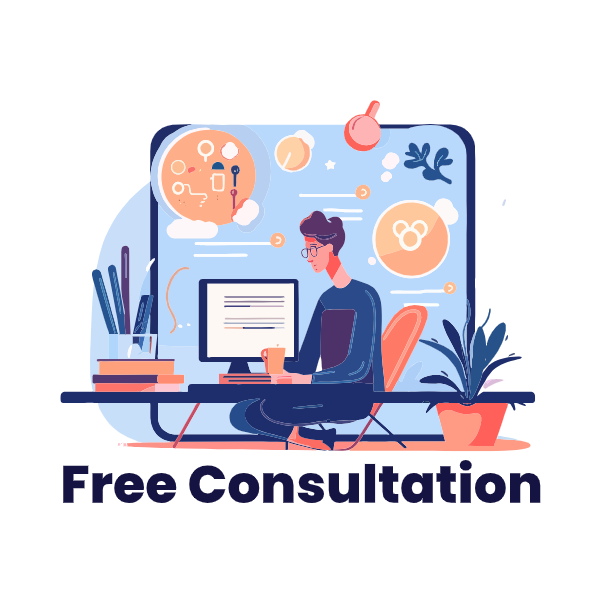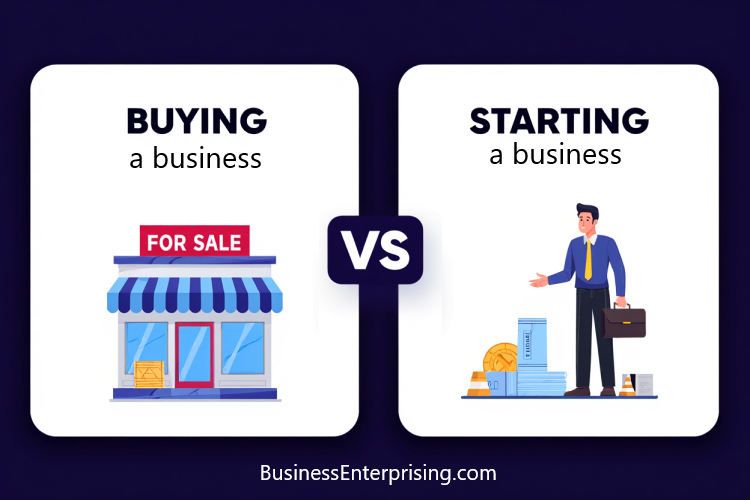
Additionally, it helps to understand the major differences between buying and starting. Buying often means taking over something already built, while starting requires building from the ground up. However, both choices involve hard work, smart planning, and the ability to adapt quickly to change.
Moreover, you should look at your available resources, such as time, money, and support. Therefore, think about how much control you want over your business operations. Additionally, consider how much uncertainty you are willing to accept during the first few years.
Choosing the right path depends heavily on your personality and experience. Therefore, the better you know yourself, the easier it becomes to make a clear decision. Additionally, being realistic about your expectations will help you avoid common mistakes and wasted resources.
However, you should remember that no option guarantees success. Both paths require dedication, smart choices, and the ability to handle setbacks. Therefore, take time to study each option closely and think about what makes sense for you and your goals.
Understanding the Key Differences Between Buying and Starting a Business
Understanding the key differences between buying and starting a business is important when planning your next move. When you buy a business, you take ownership of something that already exists. However, when you start a business, you are building everything from the ground up. Ownership transfer in buying includes customers, brand reputation, employees, and often physical assets. Meanwhile, starting a business requires creating these parts from scratch.
Additionally, buying a business usually means fewer setup tasks because systems and operations are already in place. However, starting a business demands a lot of initial work, like product development, marketing, and hiring. You must spend time setting up everything before you can generate steady revenue. Therefore, your decision should weigh how much upfront work you are willing to handle.
Moreover, risk levels are different between the two options. Buying a business often carries less risk because there is already a proven market presence. However, starting a business carries more uncertainty, especially when estimating demand or finding customers. You might also find that buying saves time, even though it may require a higher upfront investment.
Therefore, thinking about buying vs. starting a business means looking closely at your resources, patience, and long-term goals. Both paths offer rewards but require different approaches. Additionally, you must evaluate your comfort with either improving an existing business or building one yourself. With careful thought, you can choose the path that fits your skills and ambitions best.
Advantages and Disadvantages of Buying an Existing Business
Buying an existing business comes with clear advantages if you want a faster start. When you buy, you often get steady cash flow. Additionally, you benefit from existing brand recognition, which can make marketing easier and more effective. You may also inherit trained employees who already know daily operations.
However, there are disadvantages that you must consider carefully. Buying a business can mean taking on hidden liabilities, like debts or legal issues. Additionally, you may face cultural challenges when trying to adjust the team or refresh the brand. Sometimes, the way the previous owner managed the business may not fit your goals.
Therefore, when thinking about buying vs. starting a business, it helps to weigh the risks against the rewards. Buying gives you a head start, but it can also bring unexpected problems that require quick solutions. Moreover, you must analyze the financial records carefully to avoid costly surprises after the purchase.
Additionally, some businesses may have outdated systems or poor customer reviews that hurt future growth. Therefore, you need a solid plan to improve weaknesses without disrupting operations. Buying offers less setup time, but you still need to invest effort into making the business truly yours.
Although buying an existing business may seem easier, it still carries its share of risks. Therefore, take time to research and plan before making a decision. Understanding both the benefits and the challenges will help you make a smarter move toward your business goals.
Advantages and Disadvantages of Starting a Business from Scratch
Starting a business from scratch gives you the freedom to shape everything from the ground up. You choose the products, services, and brand. Additionally, you create the company culture and business model to fit your goals. This creative freedom is a major advantage for many entrepreneurs who want full control.
However, starting from scratch also brings higher risks and longer timelines. You must work hard to build a customer base from nothing. Additionally, it often takes much longer to generate consistent revenue and profits. Therefore, you must prepare for periods where income is low or unpredictable.
Moreover, the early stages often require personal investment and heavy time commitments. You may need to work longer hours without any guarantee of success. Therefore, your patience and perseverance are tested at every step. Starting a business can be rewarding, but it demands careful planning and ongoing adjustments.
Additionally, you must manage marketing, operations, and hiring without the benefit of past data or customer relationships. Therefore, mistakes can cost you valuable time and money. When comparing buying vs. starting a business, you must understand how much risk you are willing to take.
Although starting a business can be harder at first, it gives you a blank canvas to create something completely original. Therefore, if you value control and creativity, starting from scratch may fit you best. Just remember that success often comes slowly and requires strong personal commitment.
Financial Considerations: Investment, Funding, and ROI
Financial considerations play a major role when you decide between buying vs. starting a business. Buying an existing business usually requires a higher upfront investment. However, you are paying for assets, goodwill, and existing revenue streams. Additionally, lenders often feel more comfortable financing purchases with a proven track record.
Starting a business from scratch can cost less upfront, depending on your industry and plans. However, you must fund operations before seeing any return. Therefore, you may need to cover expenses like marketing, product development, and hiring without immediate income. Additionally, many startups rely on personal savings, small business loans, or outside investors.
Moreover, the potential return on investment (ROI) can vary widely between both options. Buying a business may offer faster returns because cash flow already exists. However, you must also pay down debt and handle any hidden problems that lower profitability. Additionally, competition and market changes can still impact your returns.
When you start a business, your ROI depends heavily on how quickly you grow and manage expenses. Therefore, it often takes longer to reach profitability compared to buying. However, the upside can be larger if you successfully build a strong, valuable brand.
Additionally, you must plan for unexpected costs no matter which path you choose. Therefore, always include a financial cushion in your planning. Understanding how buying vs. starting a business affects your financial future will help you make smarter choices about your investment and funding needs.
Skill Sets and Experience Needed for Each Path
Understanding the skill sets and experience needed is important when deciding between buying vs. starting a business. Buying an existing business usually requires strong management and leadership skills. Additionally, you must be able to analyze financials, improve operations, and maintain existing customer relationships. Therefore, you should feel comfortable stepping into a structure that someone else built.
However, starting a business demands a different type of skill set. You need creativity, flexibility, and a strong tolerance for risk. Additionally, you must build every part of the business from scratch, including branding, marketing, and operations. Therefore, strong innovation skills and the ability to problem-solve quickly are essential for success.
Moreover, entrepreneurs who buy businesses must adapt to an existing team and customer base. Therefore, strong interpersonal skills and change management abilities are important. Additionally, buyers must have the patience to fix issues without alienating loyal employees and customers.
When you start a business, you lead every decision from day one. Additionally, you set the culture, build the products, and create the customer experience. However, you also face the pressure of limited resources and little initial brand recognition. Therefore, confidence and resilience are important traits for founders.
Choosing between buying vs. starting a business depends on your strengths, experience, and long-term goals. Additionally, you should think about the skills you enjoy using daily. Understanding how your talents fit each path will make your decision clearer and increase your chances of success.
How to Decide: Questions Every Entrepreneur Should Ask Themselves
Deciding between buying vs. starting a business takes careful thought about your goals, skills, and comfort with risk. You must ask yourself several important questions before choosing your path. Additionally, you should think about how much control you want over building the business from scratch.
However, you must also consider your patience level. Buying a business may require quick management decisions, while starting from scratch often demands long-term commitment. Therefore, ask yourself if you prefer improving existing operations or creating something completely new. Additionally, think about how you handle uncertainty and financial risk.
Moreover, you should assess your skills honestly. Are you better at managing teams and growing existing systems? Or do you enjoy creating and experimenting without a set plan? Additionally, consider your financial situation and whether you can support a longer path to profitability if you start from zero.
Therefore, build a simple checklist for yourself. Ask if you want immediate cash flow or if you are comfortable building it over time. Additionally, decide if you prefer working within an existing structure or setting your own rules from the beginning. Think about whether you want quick returns or are willing to delay profits for greater creative control.
Choosing between buying vs. starting a business is a personal decision. Therefore, knowing your strengths, weaknesses, and tolerance for risk will help you pick the path that fits you best.
Conclusion
Choosing between buying vs. starting a business is a major decision that shapes your future. Both options offer rewards, but they also bring challenges. Therefore, you must think carefully about your goals, skills, and financial situation. Additionally, you should be honest about your willingness to take risks.
However, buying a business may suit you if you want faster cash flow and less setup work. Additionally, it may fit if you enjoy improving existing systems rather than building from scratch. Therefore, you should consider how much flexibility you need and how much risk you are willing to accept.
Starting your own business may be better if you value full creative control. Additionally, it may appeal to you if you enjoy building new ideas without following an established model. However, you must prepare for a longer timeline before seeing profits.
Moreover, you should take time to weigh the financial and personal demands of each path. Therefore, a clear plan will help you make smarter choices and avoid common mistakes. Additionally, speaking with other entrepreneurs can help you gather real-world advice before you commit.
Whatever you decide, choosing between buying vs. starting a business should align with your long-term goals and personal strengths. Therefore, trust yourself to make the decision that fits your vision and future ambitions.



